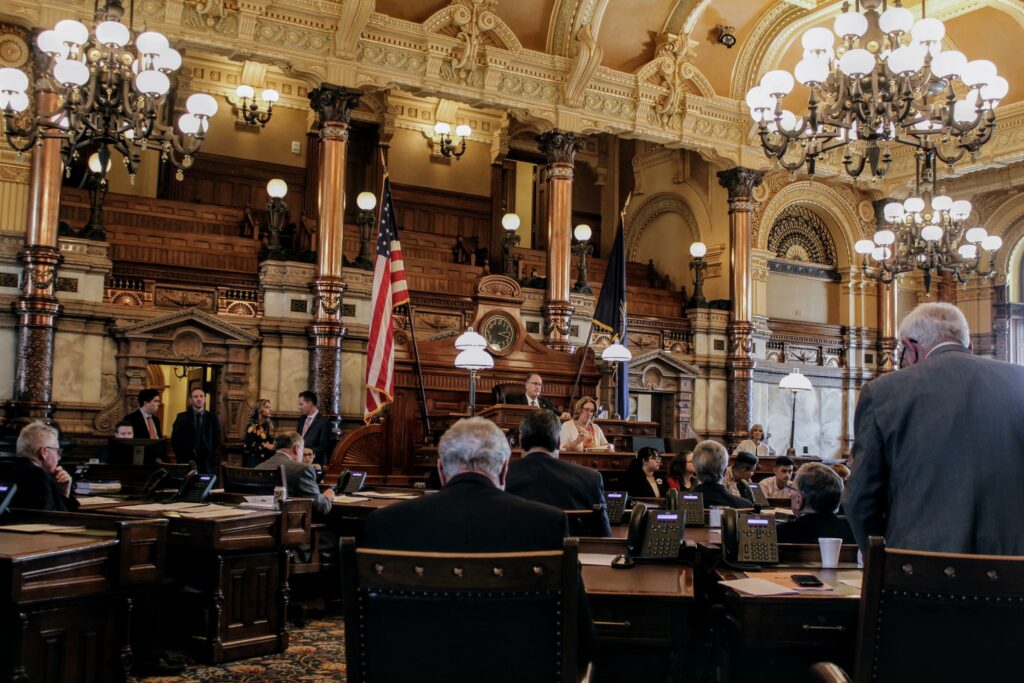
by Jim McLean, Kansas News Service
The stakes run high for 130,000-some low-income Kansans who stand to gain from expanding Medicaid coverage — and for the political players who will decide the contentious issue.
Democratic Gov. Laura Kelly made expansion a centerpiece of the election that put her in office. Two Republican leaders — Senate President Susan Wagle and Senate Majority Leader Jim Denning — could see their elevation to higher office also turn on the issue.
Signing an expansion bill into law after six years contentious debate would be a big win for the Democratic governor. Getting there will test her skills at matching wits with the Republican-controlled Legislature.
“That’s a four-year victory,” said Washburn University political scientist Bob Beatty. “You can run for reelection on that.”
So it’s not surprising, he said, that Republican leaders work overtime to prevent that or at least delay it by a year.
“Republicans are clearly a little bit afraid of handing such a huge victory to her right off the bat,” Beatty said.
That’s particularly true for Wagle. She stands among several Republicans eyeing the U.S. Senate held by Pat Roberts, who has announced he won’t seek reelection in 2020.
Wagle has emerged as Kelly’s main antagonist, fighting her on issues ranging from taxes to Medicaid expansion and quickly jumping on her administration’s missteps, including its insufficient vetting of an appeals court nominee.
When the governor called a news conference Tuesday to chastise Senate leaders for blocking consideration of a Medicaid expansion bill that passed the House two weeks ago — like a similar measure two years earlier that fell to a Republican governor’s veto — Wagle responded within minutes.
“The governor just called for the Senate to pass a bill that (Vermont senator and liberal presidential candidate) Bernie Sanders, a socialist, endorsed,” Wagle said. “That’s not going to happen in the Kansas Senate.”
Wagle’s all-out opposition to Kelly’s agenda may not be a productive legislative strategy, Beatty said, but it’s a smart political move.
“She doesn’t have to win,” he said. “But she has to be seen as fighting. That’s what Republican primary voters are going to want in the U.S. Senate.”
Denning faces different stakes. The Overland Park Republican represents a Senate district that’s transitioning politically. Kelly won it in her race against conservative Republican Kris Kobach and independent Greg Orman.
Kelly didn’t hesitate to point out that fact at a recent town hall meeting in the district that she said Denning “politely” declined to attend.
Conventional political wisdom suggests that Denning can’t oppose Kelly at every turn if he wants to survive the next election and succeed Wagle as Senate president.
Speaking on background, some Senate Republicans say Denning has acknowledged to them that the passage of Medicaid expansion is a question of when, not if.
That assessment could be the reason for a subtle but potentially meaningful change in GOP tactics.
Instead of simply refusing to consider expansion — as they’ve often done in recent years — Senate leaders are now calling for a summer study of the issue. That would mean a series of hearings that could result in a compromise bill, one more palatable to conservatives opposed to extending taxpayer-funded coverage to tens of thousands of non-disabled adults.
Any bill to emerge from those hearings, Wagle said, would look “very different than the one that (recently) passed the House.”
Among other things, it would likely set a lower eligibility threshold and require beneficiaries to work, submit to drug testing and pay premiums for their coverage, she said.
Kelly said she’s willing to compromise — on premiums for example – but has no interest in waiting until next session.
“When it comes to Medicaid expansion, study is a code word for stall,” she said.
“The time for blocking progress has long since passed,” she said. “Kansans want Medicaid expansion and they want it now.”
By now, Kelly means by the end of the week when lawmakers are scheduled to adjourn for roughly three weeks before returning May 1 for a brief wrap-up session.
While she’s not willing to endorse an interim study, Kelly said she would grudgingly go along if lawmakers wanted to spend their April break hammering out a deal for her to consider.
“I’d take that compromise,” she said.
The governor’s bill would extend Medicaid coverage to Kansans making about one-third more than the federal poverty level — $17,236 for an individual or $35,535 for a family of four.
Expansion would cover many Kansans who currently make too much to qualify for Medicaid but too little to be eligible for federal subsidies that largely cover the cost of private health insurance in the Affordable Care Act, or Obamacare, marketplace.
Kelly’s budget office estimates the state’s share of expansion costs in the first full year would be about $34 million.
Other estimates run higher. One compiled recently by the Kansas Health Institute, a nonprofit health policy think tank, puts the cost at $41.7 million.
New research done by economists at Kansas State University suggests that a spike in state tax revenue triggered by the infusion of nearly $1 billion in additional federal funds would nearly cover the state’s share of expansion costs.
Jim McLean is the senior correspondent for the Kansas News Service, a collaboration of KCUR, Kansas Public Radio, KMUW and High Plains Public Radio covering health, education and politics. You can reach him on Twitter @jmcleanks.
Kansas News Service stories and photos may be republished at no cost with proper attribution and a link to ksnewsservice.org.
See more at https://www.kcur.org/post/stakes-high-kansans-needing-coverage-and-politicians-medicaid-expansion-debate
